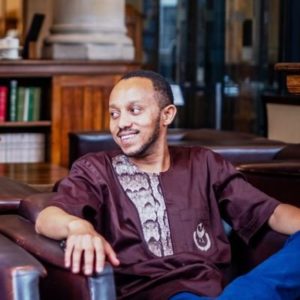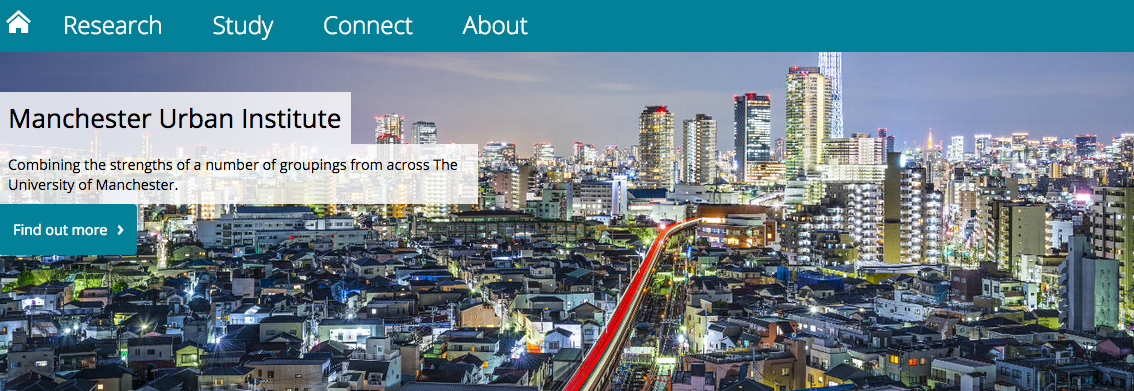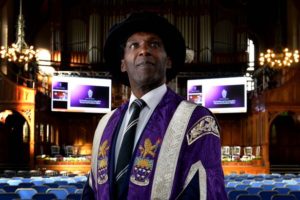 Ezana Haddis of The University of Manchester was born and raised in one of the inner-city slums of Addis Ababa. He suffered epilepsy for 16 years from the age of 11 to 27. His parents didn’t go to University. His father was in the Navy and his mother was a self-employed tailor. It became his lifelong dream to change society for the better and transform the slums.
Ezana Haddis of The University of Manchester was born and raised in one of the inner-city slums of Addis Ababa. He suffered epilepsy for 16 years from the age of 11 to 27. His parents didn’t go to University. His father was in the Navy and his mother was a self-employed tailor. It became his lifelong dream to change society for the better and transform the slums.
With his parent’s encouragement he worked his way through school then Addis Ababa University. He then completed a Masters in Urban Management and Development from Erasmus University Rotterdam. Then he joined Ethiopian Civil Service University as a lecturer. Ezana Haddis is a rising star. He tells me “I decided to do critical research on the inner-city redevelopment of Addis Ababa that have displaced more than 23,000 households to peripheral locations from the city centre.”
Ezana found out about The University of Manchester and The Global Urban Research Centre (now under the Manchester Urban Institute), which specialised on Global South studies with a critical approach towards conventional urban planning and promoting pro-poor participatory interventions. His best friend since undergrad (Eyob Balcha Gebremariam) started his PhD one-year ahead of him and said good things about the city and the university.
Ezana applied tfor a PhD in Planning and Environmental Management at The University of  Manchester and was accepted. “I was a poor civil servant earning less than £100 a month in 2014. I could not afford to pay the tuition fee and living expenses.” So he applied and secured the prestigious President’s Doctoral Scholar Award and with the generous funding of the University, he finished his PhD entitled Inner-city Redevelopment in an Aspiring Developmental State: The Case of Addis Ababa Ethiopia
Manchester and was accepted. “I was a poor civil servant earning less than £100 a month in 2014. I could not afford to pay the tuition fee and living expenses.” So he applied and secured the prestigious President’s Doctoral Scholar Award and with the generous funding of the University, he finished his PhD entitled Inner-city Redevelopment in an Aspiring Developmental State: The Case of Addis Ababa Ethiopia
This makes me proud and thankful to the President of University of Manchester Dame Nancy Rothwell.
Ezana ’s mother, Roman Gebremariam Gebreyesus, sacrificed her health by sewing dresses for more than thirty years to support her children’s schooling. When she applied for a visa to come to England to see her proud son graduate in the great Whitworth Hall this summer she was refused.
’s mother, Roman Gebremariam Gebreyesus, sacrificed her health by sewing dresses for more than thirty years to support her children’s schooling. When she applied for a visa to come to England to see her proud son graduate in the great Whitworth Hall this summer she was refused.
I am Chancellor of University of Manchester. My role is unpaid and purely ceremonial. I know that a PhD in (urban) planning & Environmental Management is needed in Ethiopia. Ezana’s intention is to boycott his graduation ceremony and protest against the UK Immigration system which statistics show “UK visa refusals are issued at twice the rate for African visitors than for those from any other part of the world.” . His protest is valid. But I am writing this blog in the hope that he will attend the  ceremony. I have spoken to him. “your family can hold a party in Addis and watch tyou take your doctorate via the Live feed which is provided by The University of Manchester.” There are many students whose loved ones won’t be able to attend for a variety of unjust reasons.
ceremony. I have spoken to him. “your family can hold a party in Addis and watch tyou take your doctorate via the Live feed which is provided by The University of Manchester.” There are many students whose loved ones won’t be able to attend for a variety of unjust reasons.
The memory of your graduation will stay with you forever. Make it a good one. You deserve it. Even if your mother is banned from the country because of the colour of her skin you must stand tall and take your degree in her name, in your name and all the generations that came before you and those that will come after you.
Ezana is on twitter @KinEz_II

This is shocking and it happens very often. I myself had a PhD student from China whose parents were refused a visa to see him graduate. They had been saving up for years for what should have been a proud occasion It was heartbreaking. The hostile environment fostered by this government runs very deep indeed.
That is really sad Karen. “They’d been saving up for years”. We must speak of this (as we are here) because things will change, maybe not in my lifetime but change they will!
Lemn, I would urge you and the University to raise this directly with the Home Office; Sajid Javid seems to take an interest in nipping high profile cases in the bud to spare himself bad publicity.
I would suggest that if the case still fails then the graduation ceremony be used to protest, not by boycotting, and also not in a way that would disrupt an important day for families lucky enough to be able to attend, but in a way calculated to embarrass the government.
Overseas students are after all an important part of the UK economy and of its ever softer “soft power” which it wants to project post Brexit.
I gave my advice in the blog. You may not have noticed. I “urge” YOU to do what you can.
Point taken Lemn, I support victims of immigration injustice on a daily basis, we can only do our best.
Your encouragement and words are paramount – I hope this young man hears and feels them.
Chr
He is attending.
Wonderful news! So pleased your wise words have inspired this young man to attend and accept the honour that is rightfully his. His gracious attendance at his doctorate presentation shines a spotlight on the disgracefully petty and vindictive behaviour of the UK government. Shame on them.
Thanks
Lemn, you were the Chancellor at my Master’s ceremony in July 2018. My Dad was not there because he died suddenly in Sept 2017. He had always supported and encouraged my education. So it was a bittersweet day for me. But I needed to do it because it was such a huge achievement. The ceremony was not less because he wasn’t there. It just held a deeper level of emotion for me when I think back on it. I really hope that Ezana Haddis attends his ceremony; and that he takes away the emotions of the day to make the world better for future African students. This needs to be shouted far and wide. There is a grave injustice going on here, it this man should not have to skip a very important ceremony due to the ignorance of others.
I agree Sheridan. Thankyou for sharing.
Bravo Ezana!
We salute you and your graduation!
And warmest wishes to your family watching you…
We do
Are tourist visas blocked? Unbelievable….since tourists travel to London constantly without visas from western countries, Asia but not Africa??
In Africa, the UK gov’t collects the money and refuses the visa without valid reason to do so. It is a kind of free income for UK gov’t. Who knows possibly bigger than its tax collections.
This problem is not only for tourist visa I personally know many families live separated because of refused family visas also. I myself paid 26000 birr (812 GBP) hard earned money received their a refusal letter.
They don’t ban it b/s it is the BIG source of their income from Africa after colonization.
What on earth does the Home Office imagine his Mums going to do? Steal the crown jewels?
Compassion and love is what this country is crying out for.
Thank you for raising the issue.
Thanks
Somewhat relatedly, this reminds me of an antibiotics development conference I went to in Berlin last year. If I remember correctly, two of the talks were cancelled at the last minute because the African scientists due to give them had been refused visas. Looking online, it seems like African academics are frequently refused visas to UK meetings too. Not surprising given the culture at the Home Office – but I hope that conference organisers will do more to publicise these refusals in future.
we hope